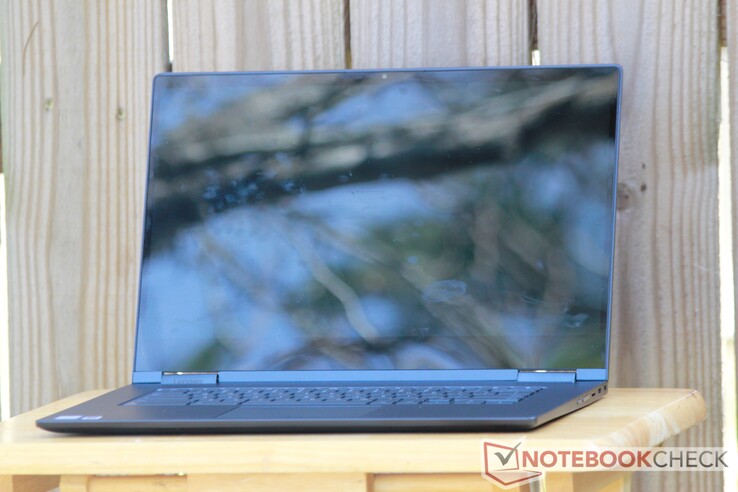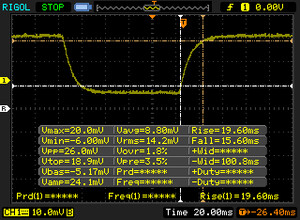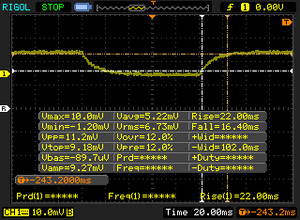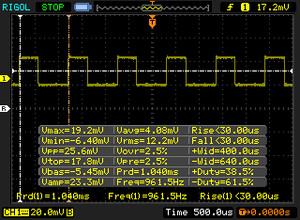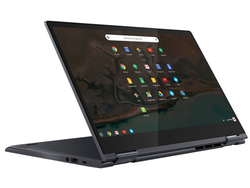Breve Análise do Conversível Lenovo Yoga Chromebook C630
Os Top 10
» Os Top 10 Portáteis Multimídia
» Os Top 10 Portáteis de Jogos
» Os Top 10 Portáteis Leves para Jogos
» Os Top 10 Portáteis Acessíveis de Escritório/Empresariais
» Os Top 10 Portáteis Premium de Escritório/Empresariais
» Os Top 10 dos Portáteis Workstation
» Os Top 10 Subportáteis
» Os Top 10 Ultrabooks
» Os Top 10 Conversíveis
» Os Top 10 Tablets
» Os Top 10 Smartphones
» A melhores Telas de Portáteis Analisadas Pela Notebookcheck
» Top 10 dos portáteis abaixo dos 500 Euros da Notebookcheck
» Top 10 dos Portáteis abaixo dos 300 Euros
| SD Card Reader - average JPG Copy Test (av. of 3 runs) | |
| Média da turma Convertible (28.1 - 209, n=23, últimos 2 anos) | |
| Lenovo Yoga Chromebook C630-81JX0008UX (Toshiba Exceria Pro M501 UHS-II) | |
| Dell Inspiron 7486 Chromebook 14 2-in-1 (Toshiba Exceria Pro M501 UHS-II) | |
| Acer Chromebook 14 CP5-471-53QV (Toshiba Exceria Pro SDXC 64 GB UHS-II) | |
| Lenovo Chromebook C330-81HY0000US (Toshiba Exceria Pro SDXC 64 GB UHS-II) | |
| Dell Chromebook 11 3181 2-in-1 (Toshiba Exceria Pro M501 UHS-II) | |
| Networking | |
| iperf3 transmit AX12 | |
| Lenovo Yoga Chromebook C630-81JX0008UX | |
| Dell Inspiron 7486 Chromebook 14 2-in-1 | |
| Google Pixelbook | |
| iperf3 receive AX12 | |
| Dell Inspiron 7486 Chromebook 14 2-in-1 | |
| Lenovo Yoga Chromebook C630-81JX0008UX | |
| Google Pixelbook | |
| |||||||||||||||||||||||||
iluminação: 76 %
iluminação com acumulador: 281.2 cd/m²
Contraste: 1172:1 (Preto: 0.24 cd/m²)
ΔE ColorChecker Calman: 3.63 | ∀{0.5-29.43 Ø4.77}
ΔE Greyscale Calman: 3.3 | ∀{0.09-98 Ø5}
Gamma: 2.349
CCT: 6299 K
| Lenovo Yoga Chromebook C630-81JX0008UX IPS, 15.6", 3840x2160 | Google Pixelbook IPS, 12.3", 2400x1600 | Dell Inspiron 7486 Chromebook 14 2-in-1 IPS, 14", 1920x1080 | Acer Chromebook 14 CP5-471-53QV IPS, 14", 1920x1080 | Lenovo Chromebook C330-81HY0000US IPS, 11.6", 1366x768 | Acer Chromebook R13 CB5-312T-K0YK IPS, 13.3", 1920x1080 | Dell Chromebook 11 3181 2-in-1 IPS, 11.6", 1366x768 | |
|---|---|---|---|---|---|---|---|
| Response Times | -28% | 2% | 12% | 1% | 18% | -10% | |
| Response Time Grey 50% / Grey 80% * (ms) | 38.4 ? | 59.2 ? -54% | 40.8 ? -6% | 38 ? 1% | 43.2 ? -13% | 38 ? 1% | 52.8 ? -38% |
| Response Time Black / White * (ms) | 35.2 ? | 36 ? -2% | 32 ? 9% | 27 ? 23% | 30.4 ? 14% | 23 ? 35% | 28.8 ? 18% |
| PWM Frequency (Hz) | 962 ? | 820 ? | |||||
| Screen | -4% | 15% | 17% | -27% | -14% | -38% | |
| Brightness middle (cd/m²) | 281.2 | 473.9 69% | 348.1 24% | 214 -24% | 198.9 -29% | 192 -32% | 213 -24% |
| Brightness (cd/m²) | 262 | 443 69% | 321 23% | 214 -18% | 204 -22% | 204 -22% | 218 -17% |
| Brightness Distribution (%) | 76 | 80 5% | 85 12% | 90 18% | 95 25% | 88 16% | 94 24% |
| Black Level * (cd/m²) | 0.24 | 0.35 -46% | 0.28 -17% | 0.1 58% | 0.16 33% | 0.23 4% | 0.21 12% |
| Contrast (:1) | 1172 | 1354 16% | 1243 6% | 2140 83% | 1243 6% | 835 -29% | 1014 -13% |
| Colorchecker dE 2000 * | 3.63 | 3.9 -7% | 1.75 52% | 3.24 11% | 3.52 3% | ||
| Colorchecker dE 2000 max. * | 4.5 | 7.7 -71% | 4.74 -5% | 17.61 -291% | 18.36 -308% | ||
| Greyscale dE 2000 * | 3.3 | 5.4 -64% | 2.6 21% | 3.86 -17% | 1.6 52% | 3.99 -21% | 2.6 21% |
| Gamma | 2.349 94% | 2.13 103% | 2.206 100% | 2.42 91% | 2.311 95% | 2.45 90% | 2.283 96% |
| CCT | 6299 103% | 7643 85% | 6441 101% | 6276 104% | 6553 99% | 6380 102% | 6861 95% |
| Média Total (Programa/Configurações) | -16% /
-9% | 9% /
12% | 15% /
16% | -13% /
-21% | 2% /
-6% | -24% /
-32% |
* ... menor é melhor
Exibir tempos de resposta
| ↔ Tempo de resposta preto para branco | ||
|---|---|---|
| 35.2 ms ... ascensão ↗ e queda ↘ combinadas | ↗ 19.6 ms ascensão | |
| ↘ 15.6 ms queda | ||
| A tela mostra taxas de resposta lentas em nossos testes e será insatisfatória para os jogadores. Em comparação, todos os dispositivos testados variam de 0.1 (mínimo) a 240 (máximo) ms. » 93 % de todos os dispositivos são melhores. Isso significa que o tempo de resposta medido é pior que a média de todos os dispositivos testados (20.2 ms). | ||
| ↔ Tempo de resposta 50% cinza a 80% cinza | ||
| 38.4 ms ... ascensão ↗ e queda ↘ combinadas | ↗ 22 ms ascensão | |
| ↘ 16.4 ms queda | ||
| A tela mostra taxas de resposta lentas em nossos testes e será insatisfatória para os jogadores. Em comparação, todos os dispositivos testados variam de 0.165 (mínimo) a 636 (máximo) ms. » 56 % de todos os dispositivos são melhores. Isso significa que o tempo de resposta medido é pior que a média de todos os dispositivos testados (31.5 ms). | ||
Cintilação da tela / PWM (modulação por largura de pulso)
| Tela tremeluzindo/PWM detectado | 962 Hz | ||
| ≤ 99 brilho cd/m² | |||
A luz de fundo da tela pisca em 962 Hz (pior caso, por exemplo, utilizando PWM) Cintilação detectada em uma configuração de brilho de 99 cd/m² e abaixo. Não deve haver cintilação ou PWM acima desta configuração de brilho. A frequência de 962 Hz é bastante alta, então a maioria dos usuários sensíveis ao PWM não deve notar nenhuma oscilação. A cintilação ocorre em configurações de brilho relativamente baixas, portanto, o uso prolongado nesta configuração de brilho ou inferior pode causar fadiga ocular. [pwm_comparison] Em comparação: 53 % de todos os dispositivos testados não usam PWM para escurecer a tela. Se PWM foi detectado, uma média de 8070 (mínimo: 5 - máximo: 343500) Hz foi medida. | |||
* ... menor é melhor
Barulho
| Ocioso |
| 28 / 28 / 28 dB |
| Carga |
| 29.2 / 32.4 dB |
 | ||
30 dB silencioso 40 dB(A) audível 50 dB(A) ruidosamente alto |
||
min: | ||
(+) A temperatura máxima no lado superior é 29 °C / 84 F, em comparação com a média de 35.3 °C / 96 F , variando de 19.6 a 60 °C para a classe Convertible.
(+) A parte inferior aquece até um máximo de 37.8 °C / 100 F, em comparação com a média de 36.8 °C / 98 F
(+) Em uso inativo, a temperatura média para o lado superior é 21.4 °C / 71 F, em comparação com a média do dispositivo de 30.3 °C / ### class_avg_f### F.
(+) Os apoios para as mãos e o touchpad são mais frios que a temperatura da pele, com um máximo de 22.2 °C / 72 F e, portanto, são frios ao toque.
(+) A temperatura média da área do apoio para as mãos de dispositivos semelhantes foi 27.9 °C / 82.2 F (+5.7 °C / 10.2 F).
Lenovo Yoga Chromebook C630-81JX0008UX análise de áudio
(-) | alto-falantes não muito altos (###valor### dB)
Graves 100 - 315Hz
(-) | quase nenhum baixo - em média 18.8% menor que a mediana
(±) | a linearidade dos graves é média (12.8% delta para a frequência anterior)
Médios 400 - 2.000 Hz
(+) | médios equilibrados - apenas 1.8% longe da mediana
(±) | a linearidade dos médios é média (8.2% delta para frequência anterior)
Altos 2 - 16 kHz
(+) | agudos equilibrados - apenas 2.4% longe da mediana
(+) | os máximos são lineares (6.6% delta da frequência anterior)
Geral 100 - 16.000 Hz
(±) | a linearidade do som geral é média (20.3% diferença em relação à mediana)
Comparado com a mesma classe
» 52% de todos os dispositivos testados nesta classe foram melhores, 7% semelhantes, 41% piores
» O melhor teve um delta de 6%, a média foi 20%, o pior foi 57%
Comparado com todos os dispositivos testados
» 52% de todos os dispositivos testados foram melhores, 8% semelhantes, 39% piores
» O melhor teve um delta de 4%, a média foi 24%, o pior foi 134%
Dell Inspiron 7486 Chromebook 14 2-in-1 análise de áudio
(-) | alto-falantes não muito altos (###valor### dB)
Graves 100 - 315Hz
(-) | quase nenhum baixo - em média 17.9% menor que a mediana
(±) | a linearidade dos graves é média (12.4% delta para a frequência anterior)
Médios 400 - 2.000 Hz
(+) | médios equilibrados - apenas 4.4% longe da mediana
(±) | a linearidade dos médios é média (7.4% delta para frequência anterior)
Altos 2 - 16 kHz
(+) | agudos equilibrados - apenas 3.1% longe da mediana
(±) | a linearidade dos máximos é média (10.2% delta para frequência anterior)
Geral 100 - 16.000 Hz
(±) | a linearidade do som geral é média (22.1% diferença em relação à mediana)
Comparado com a mesma classe
» 65% de todos os dispositivos testados nesta classe foram melhores, 6% semelhantes, 29% piores
» O melhor teve um delta de 6%, a média foi 20%, o pior foi 57%
Comparado com todos os dispositivos testados
» 63% de todos os dispositivos testados foram melhores, 6% semelhantes, 30% piores
» O melhor teve um delta de 4%, a média foi 24%, o pior foi 134%
Google Pixelbook análise de áudio
(-) | alto-falantes não muito altos (###valor### dB)
Graves 100 - 315Hz
(-) | quase nenhum baixo - em média 17.1% menor que a mediana
(±) | a linearidade dos graves é média (10.2% delta para a frequência anterior)
Médios 400 - 2.000 Hz
(±) | médios mais altos - em média 5.4% maior que a mediana
(±) | a linearidade dos médios é média (8.4% delta para frequência anterior)
Altos 2 - 16 kHz
(±) | máximos mais altos - em média 5.7% maior que a mediana
(+) | os máximos são lineares (5.8% delta da frequência anterior)
Geral 100 - 16.000 Hz
(±) | a linearidade do som geral é média (24.8% diferença em relação à mediana)
Comparado com a mesma classe
» 75% de todos os dispositivos testados nesta classe foram melhores, 6% semelhantes, 18% piores
» O melhor teve um delta de 6%, a média foi 20%, o pior foi 57%
Comparado com todos os dispositivos testados
» 75% de todos os dispositivos testados foram melhores, 5% semelhantes, 19% piores
» O melhor teve um delta de 4%, a média foi 24%, o pior foi 134%
| desligado | |
| Ocioso | |
| Carga |
|
Key:
min: | |
| Lenovo Yoga Chromebook C630-81JX0008UX i5-8250U, UHD Graphics 620, 128 GB eMMC Flash, IPS, 3840x2160, 15.6" | Dell Inspiron 7486 Chromebook 14 2-in-1 i3-8130U, UHD Graphics 620, 128 GB eMMC Flash, IPS, 1920x1080, 14" | Lenovo Chromebook C330-81HY0000US MT8173C, PowerVR GX6250, , IPS, 1366x768, 11.6" | Dell Chromebook 11 3181 2-in-1 N3060, HD Graphics 400 (Braswell), 64 GB eMMC Flash, IPS, 1366x768, 11.6" | Acer Chromebook 14 CP5-471-53QV 6200U, HD Graphics 520, 32 GB eMMC Flash, IPS, 1920x1080, 14" | Acer Chromebook R13 CB5-312T-K0YK MT8173C, PowerVR GX6250, 32 GB eMMC Flash, IPS, 1920x1080, 13.3" | |
|---|---|---|---|---|---|---|
| Power Consumption | 22% | 45% | 36% | -2% | -8% | |
| Idle Minimum * (Watt) | 1.3 | 1.6 -23% | 1.4 -8% | 1.8 -38% | 2.7 -108% | 3.8 -192% |
| Idle Average * (Watt) | 9.3 | 6.3 32% | 4.9 47% | 4.9 47% | 6.2 33% | 6.2 33% |
| Idle Maximum * (Watt) | 9.5 | 6.5 32% | 5 47% | 5 47% | 6.7 29% | 6.6 31% |
| Load Average * (Watt) | 12.9 | 8.1 37% | 5.3 59% | 6.8 47% | 14 -9% | 11 15% |
| Load Maximum * (Watt) | 43.3 | 28.6 34% | 7.9 82% | 9.8 77% | 24 45% | 12.7 71% |
* ... menor é melhor
| Lenovo Yoga Chromebook C630-81JX0008UX i5-8250U, UHD Graphics 620, 56 Wh | Google Pixelbook i5-7Y57, HD Graphics 615, 41 Wh | Dell Inspiron 7486 Chromebook 14 2-in-1 i3-8130U, UHD Graphics 620, 56 Wh | Lenovo Chromebook C330-81HY0000US MT8173C, PowerVR GX6250, 45 Wh | Dell Chromebook 11 3181 2-in-1 N3060, HD Graphics 400 (Braswell), 42 Wh | Acer Chromebook 14 CP5-471-53QV 6200U, HD Graphics 520, 45 Wh | Acer Chromebook R13 CB5-312T-K0YK MT8173C, PowerVR GX6250, 53.9 Wh | |
|---|---|---|---|---|---|---|---|
| Duração da bateria | |||||||
| WiFi v1.3 (h) | 6.4 | 13.9 117% | 10.6 66% | 11.6 81% | 12.9 102% | 9 41% | 12.9 102% |
Pro
Contra
O Lenovo Yoga Chromebook C630 é uma poderosa besta 4K que, no final, prova ser demais para o Chrome OS lidar. Embora o C630 seja um dos portáteis com o SO Chrome mais avançado de todos os tempos, a maior parte desse poder é excessiva e prejudica os fatores que fazem os Chromebooks se destacarem no mercado.
Em particular, a duração da bateria é baixa em comparação com os concorrentes e está muito longe do que esperamos de um Chromebook. Além disso, o dispositivo é talvez o Chromebook menos portátil que já testamos. Esse é o preço a pagar por um portátil conversível de 15,6 polegadas. Para uma família de dispositivos que se vende para usuários em em movimento, o C630 fica pesado e desconfortável para transportá-lo de casa para a sala de aula, para o trabalho, para um café.
O C630 não oferece o suficiente para se distanciar significativamente dos concorrentes. O Pixelbook não é muito mais caro e oferece a maioria dessas sutilezas em um pacote mais compacto. O Inspiron Chromebook 14 da Dell tem um formato ligeiramente menor e acompanha o desempenho do Chromebook Yoga C630 pelo mesmo preço. O Inspiron também inclui uma caneta ativa e possui uma das melhores exibições que já vimos em um Chromebook.
Existem algumas coisas boas. Por um lado, a tela 4K é nítida e bonita. Além disso, as opções generosas de RAM e armazenamento "futureproof", o dispositivo como o Chrome OS, inevitavelmente se tornarão mais exigentes no futuro. Considerando os avanços que a Google fez na integração nativa do Android e do Linux no Chrome OS, pode não demorar muito para que os 8 GB de RAM se tornem a norma para os Chromebooks.
Considerando tudo, o Lenovo Yoga Chromebook é um dispositivo competente, mas se sente sobre dimensionado para o software que está executa. Embora a tela 4K, 8 GB de RAM e CPU Core i5 sejam ótimas caixas de verificação para o marketing, eles acabam oferecendo pouco mais do que outros Chromebooks premium. O C630 subsequentemente se sente muito inchado para o Chrome OS. Existem melhores opções nesta faixa de preço.
Lenovo Yoga Chromebook C630-81JX0008UX
- 02/22/2019 v6 (old)
Sam Medley


